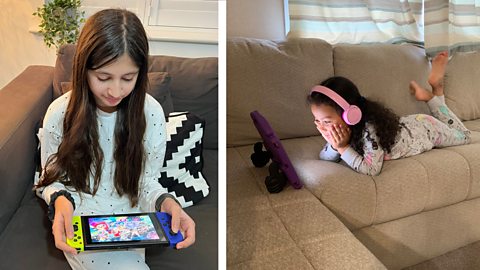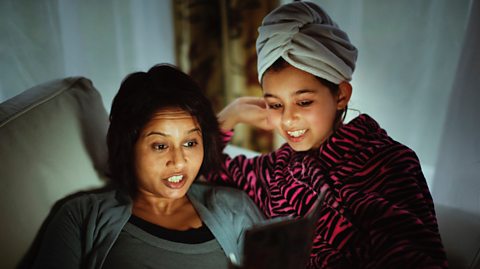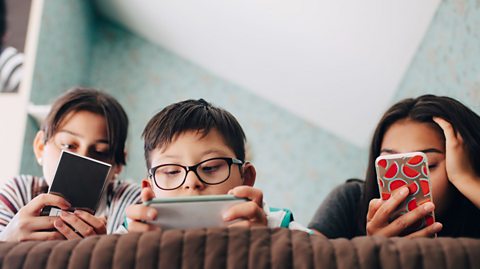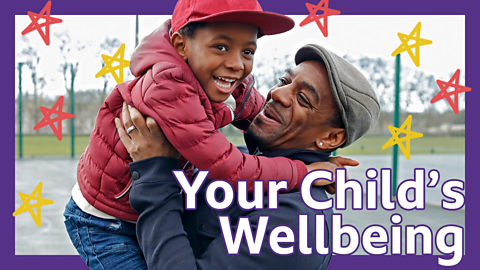As a parent you might often feel scared of the world online, as you're not always very familiar with everything that lies within, or you can’t quite keep up with your child’s tech savviness. But it’s important to teach your child to behave online just as they would in real life.
Dr Linda Papadopoulos tells us why it's important for children to be kind to each other online and gives you the tools to help you have a conversation about kindness with your child.
Dr Linda Papadopoulos: For children it's never been more important to support each other, and to speak up when and if they come across a situation online that's unfair. So how do we check in with our kids and teach them, and remind them, to be kind online?
Title: Behind every profile there's a real person
Behind every profile picture there's a real person, with real feelings, it's really key. So especially if your child is just getting used to chatting online, it can take a while for them to work out those small nuances of, you know, what is and isn't appropriate. So they'll need guidance from you to make those safer choices, help them to realise that just because you're behind a screen doesn't mean that your actions will have less of an impact, or be less hurtful.
On the other hand, encourage them to, kind of, pause before sharing. I think a lot of times what happens online is that, kind of, knee jerk reaction and just taking that beat, thinking about what they're going to say and asking themselves, 'is this something that I'd say to someone face to face?' So again, this idea that their words, their actions are actually not just going out into the ether, they're going to impact someone. So remind them that when they post, whether it's a joke or a comment, others really can't see through those smaller things, whether they're smiling or they're laughing - again those nuances. So get them to thing about, sort of, considering whether it's a good idea to share something written in that way or shared in that way, or not. So it's about taking that beat to think more critically, about not just what they're saying but, very very importantly, how they're saying it.
And finally, if they're older and still quite savvy about what they share, it doesn't hurt to remind them of that good old t-shirt test - so if you wouldn't put it on a t-shirt for everyone else to see, it's probably not best to share online!
Title: Encourage them to be inclusive and not leave others out
Try and talk about how it might make someone feel to be left out of a group - encouraging them to empathise with people in another group is really, really important both online and off, right. So encourage them to try and be more inclusive when it comes to things like group chats or online gaming. Make sure they know how to treat others, and critically, get them to think of how they'd like to be treated themselves.
Title: Talk about the importance of helping others
I think the idea of speaking to your child about whether they're going to be a bystander or an upstander is a critical one, whether it's online or off. So whether it's encouraging your child to send a supportive message to a friend that's struggling to let them know that they're not alone. If your child sees something unkind online encourage them not to make the situation worse by inadvertently provoking those involved even further.
Title: Give them coping strategies to respond if someone is being unkind to them
Encourage your child to celebrate what makes them, and others, so unique so they see differences as something positive. If your child is a victim of cyberbullying make sure you talk about it, don't stop them going online - block or report the bully and show your support. You can also visit the Internet Matters website, which offers a range of advice to get to grips with helping your child be kind online.
How we behave online shouldn't differ from how we behave offline, teaching our children about kindness online will benefit them, and others around them.
Here are some useful tips on how to teach your child to be kind and respectful online.
1. Stay curious
You might not be a digital native but showing your child that you’re interested in what they're doing online is the best way to stay up-to-date with them. Remember that you're a guide for them both online and offline. And if you feel like you're not savvy enough, check out some of Parents' Toolkit's resources for helping your child navigate the online world.
2. Pause before you post
Sometimes it’s easy to think that the online world is separate to real life. Make sure your kids know that just because they’re behind a screen doesn’t mean their actions will have any less of an impact. Get them to think about what consequences their words could have and encourage them to think critically about the way they communicate.
3. Promote inclusivity
What you teach to your child offline is also true online. So, encourage them to be empathetic towards other people, take time to sit down and talk to them. Ask them how they'd feel if someone treated them unfairly online. Ultimately encourage them to be upstanders and speak out if they see something wrong.
Give them tools to cope with cyberbullying
If you think your child is being bullied online, you need to act now. Try to talk to them and make sure they know you're there for them. You shouldn’t immediately stop them from taking part online, but rather show them your support and give tools and strategies to block and report bullying behaviour.
Check out ways you can help your child cope with cyberbullying.
For more resources and advice on cyber safety and digital wellbeing for families, visit the Internet Matters website.
Why not check out some of the other episodes in the series?
What games are your kids playing online? discussing how kids are gaming.
Originally published as part of Own It - the BBC's place children can find help, support and advice on how to live their best and safest online life.
Check out the CBBC Gaming Hub with your child to explore articles all about gaming, cool clips, and even games to play!

More from BBC Bitesize Parents' Toolkit…
Parents' Toolkit
Fun activities, real-life stories, wellbeing support and loads of helpful advice - we're here for you and your child.

Dear Parents' Toolkit... How much screen time is too much?
Parents across the UK share their thoughts on screens and internet safety. Should I use them in parenting? What is 'screen guilt'? And how do I get my child away from them?

What's the best alternative to screen time? - The Super Tutors
Shona Goodall, 'The Fun One', explains how you can tempt your child away from the tech.

How to manage your child’s online world without clashing
Children and teens spend lots of time online for school and leisure, which can be a worry for parents. Here's some advice on managing your child’s screen time.

How technology has made parenting more difficult and how to navigate it
BBC Bitesize Parents' Toolkit looks at how widespread access to the internet for our children is causing clashes at home, with negative and positive aspects.

